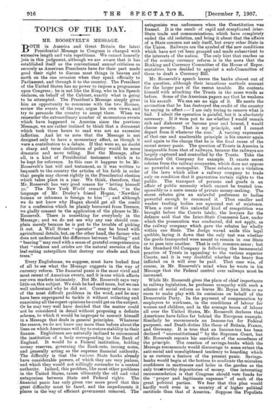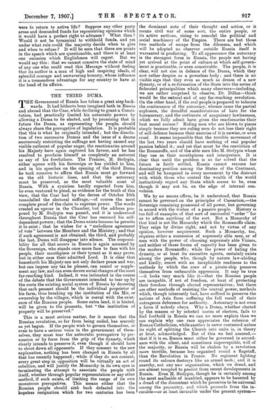TOPICS OF THE DIY. .
MR. ROOSEVELT'S MESSAGE. BOTH in America and Great Britain the latest Presidential Message to Congress is charged with excessive length and vain repetitions. We cannot honestly join in this judgment, although we are aware that it has established itself as the conventional annual criticism as securely as American Presidents have for their part made good their right to discuss most things in heaven and earth on the one occasion when they speak officially to Parliament, and through it to the country: The President of the United States has no power to impose a programme upon Congress ; he is not like the King, who in his Speech declares, on behalf of the Cabinet, exactly what is going to be attempted. The President's Message simply gives him an opportunity to commune with the two Houses, review the events of the year, argue his own views, and try to persuade the country to accept them. When we remember the extraordinary number of momentous events which have happened in America since the previous Message, we are rather inclined to think that a document which took three hours to read was not an excessive infliction. And let us note that the Message is not designed only to have a momentary effect, as though it were a contribution to a debate. If that were so, no doubt a sharp and terse declaration of policy would be more dramatic and more telling. But the Message, after all, is a kind of Presidential testament which is to be kept for reference. In this case it happens to be Mr. Roosevelt's last will and testament, as it was written to bequeath to the country the articles of his faith in order that people may choose rightly in the Presidential election which takes place in a year. We think„ therefore, that Mr. Roosevelt has very good reason for " letting himself go." The New York World remarks that, " in the language of Mr. Dooley's friend Hogan, ' Nawthin' human or inhuman is foreign to him " ; and although we do not know why Hogan should get all the credit for a confession which he plainly borrowed from Terence, we gladly consent to the application of the phrase to Mr. Roosevelt. There is something for everybody in the Message ; and we do not see why any one should com- plain merely because he is put to the trouble of picking it out. A Wall Street " operator " may be bored with agricultural details, but, on the other hand, the farmer who does not understand the difference between " bulling " and bearing " may read with a sense of grateful comprehension that "cuckoos and orioles are the natural enemies of the leaf-eating caterpillars that destroy our shade and fruit trees."
Every Englishman, we suppose, must have looked first of all to see what the Message suggests in the way of currency reform. The financial panic is the most vivid and most recent of American events, and it is one which affects our own markets intimately. But Mr. Roosevelt says very -little on this subject. We wish he had said more, but we can well understand why he did not. Currency reform is one of the most difficult problems in the word, and he may have been unprepared to tackle it without collecting and examining all the expert opinions he could get on the subject. Or he may very well have decided that the matter could • not be considered in detail without proposing a definite scheme, to which it would be improper to commit himself in a Message that deals in general principles. Whatever the reason, we do not know any more than before about the lines on which Americans will try to restore stability to their finance. Englishmen are naturally inclined to recommend the institution of a body corresponding to the Bank of England. It would be a Federal institution, holding money reserves, governing the Bank-rate, issuing notes, and generally acting as the supreme financial authority. The difficulty is that the various State banks already have considerable powers, of which they are very jealous, and which they would not willingly surrender to a central authority. Indeed, this problem, like most other problems in .the United States, raises ultimately the old and vital antagonism between State and Federal rights. The :financial panic has only given one more proof that this great difficulty must be faced, and the impediments it places in the way of efficient government removed. ' The antagoniem was . unforeseen . when the Constitution was framed. It is the result of rapid and complicated inter- State trade and communications, which have completely ended the old isolation, and bring it about that the affairs of a State concern not only itself, but every other State in the Union. Railways are the symbol of the new conditions which have not yet been grasped and made subservient to the interests of the nation. The only hint that reaches us of the coming currency reform is in the news that the Banking and Currency Committee of the House of Repre- sentatives have decided to appoint a sub-Committee of three to draft a Currency Bill.
Mr. Roosevelt's speech leaves the banks almost out of the question, although their incautious methods account for the larger part of the recent trouble. He contents himself with attacking the Trusts in the same words as before. Some of the American papers say that he weakens in his assault. We can see no sign of it. He meets the accusation• that he has destroyed the credit of the country by saying in effect :—' I am only trying to remove what is bad. I admit the operation is painful, but it is absolutely necessary. If it were put to me whether I would remain rich and dishonest or become poor and honest, I would choose poverty. That is my principle, and I cannot depart from it whatever the cost.' A varying expression of that one and unalterable principle is his answer again and again to the charge that he is the final cause of the recent money panic. The question of Trusts in America is inseparable from that of railways, because the railways are largely captured and controlled by the Trusts. Take the Standard Oil Company for example. It exacts secret rebates from the railway companies, which dare not oppose so powerful a monopolist. These rebates are a violation of. the laws which allow a railway company to trade only on condition. that it guarantees certain rights to the public. The transport of persons and goods is an affair of public necessity which cannot be treated irre- sponsibly as a mere means of private money-making. The secret rebates give an unlawful preference to bodies powerful enough to command it. Thus smaller and weaker trading bodies. are squeezed out of existence. When a case of this unlawful kind of competition was brought before the Courts lately, the lawyers for .the defence said that the Inter-State Commerce Law, under which the prosecution was conducted, did not apply, as the railway company which gave the rebates lay wholly within one State. The Judge waved aside this legal quibble, laying it down that the only test. was whether the goods transported were meant to remain in one State or to pass into another. That is only common-sense; but the Standard Oil Company is following the immemorial practice .of Trusts in appealing to the various superior Courts, and it is very doubtful whether the heavy fine inflicted on it will ever be paid. That case was, of course, in Mr. Roosevelt's mind when he wrote in his Message that the Federal control over railways must be increased.
While Mr. Roosevelt gives the place of chief importance to railway legislation, he professes sympathy with such a scheme of social reform as leaves Mr. Bryan little or no room to make play with its omissions on behalf of the Democratic Party. In the payment of compensation by employers to workmen, in the conditions of labour for women and children, and in the average hours of labour all over the United States, Mr. Roosevelt declares that Americans have fallen far behind the European example. Similarly he recommends an Income-tax for Federal purposes, and Death-duties like those of Britain, France, and Germany. It is true that an Income-tax has been declared " unconstitutional " by the Supreme Court, but Mr. Roosevelt repeats his conviction of the soundness of the principle. The creation of savings-banks which• the Message recommends would discourage to some extent the anti-social and unenlightened tendency to hoarding which is so curious a feature of the present panic. Savings- banks would begin at the bottom to eradicate the mistaken confidence in mattresses and holes in the garden as the only trustworthy depositories of money. One interesting recommendation is that Congress should vote funds for the "proper and legitimate- expenses" of each .of the great political parties. We fear- that this plan would hardly • work even in a country . of a higher political rectitude than that -of America. Suppose the Populists were to return to active life? Suppose any other party arose and demanded funds for representing opinions which it would have a perfect right to advance ? What then ? Would it not be tyrannical to withhold funds, and yet under what rule could the majority decide when to give and when to refuse ? It will be seen that there are points in the speech which are questionable, and there is at least one omission which Englishmen will regret. But we would say this : that we cannot conceive the state of mind of any one who could read this Message without feeling that its author is a man of high and inspiring ideals, of splendid courage and unwavering honesty, whose influence it is a tremendous advantage for any country to have at the head of its affairs.











































































 Previous page
Previous page